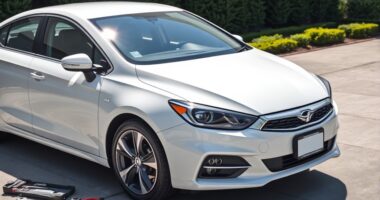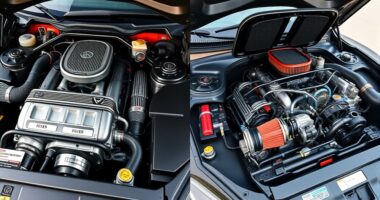To keep your tuned car road legal, first check your state’s laws on modifications, emissions, noise, and lighting. Confirm all safety features and lighting meet federal standards, and use parts certified for safety and emissions compliance. Keep detailed documentation of all upgrades and inspections, and stay updated on local regulations to avoid fines or penalties. Following proper procedures helps you stay compliant—and if you want to know more, there’s plenty to explore.
Key Takeaways
- Verify that all modifications comply with your state’s vehicle laws, including exhaust, lighting, and tint restrictions.
- Ensure your engine tuning and emissions adjustments have proper certifications or EO exemptions to meet EPA and state standards.
- Maintain detailed documentation of parts, modifications, and certifications to provide proof during inspections or smog checks.
- Regularly test noise levels and lighting to stay within legal limits, using certified equipment and adhering to local enforcement standards.
- Keep your vehicle’s safety features and emissions systems in proper working order to pass inspections and avoid legal penalties.
Understand Your State’s Vehicle Modification Laws
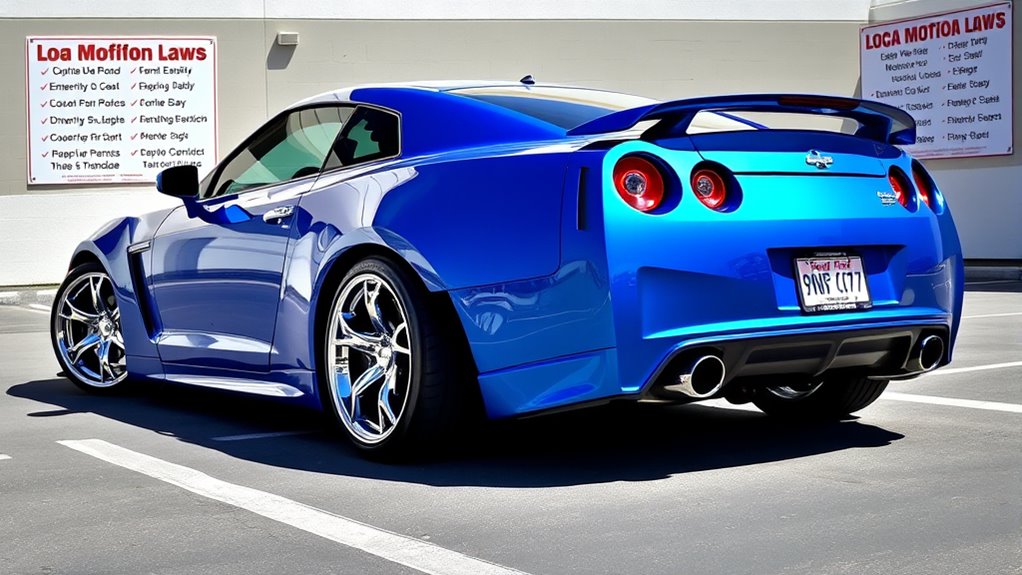
To keep your tuned car street-legal, you need to understand the specific vehicle modification laws in your state. Each state has its own rules about what modifications are allowed, from exhaust systems to window tints and lighting. Some states set strict limits on tint darkness, while others are more lenient, like Florida. You also have to regard federal standards, especially for engine and emissions modifications, which must meet EPA regulations. Penalties for violations can include fines, misdemeanor, or even felony charges, depending on severity. Enforcement varies by jurisdiction, so it’s essential to research local laws thoroughly. Consulting state-specific guides or local authorities can help you stay compliant. Staying informed ensures you avoid legal trouble and keeps your car road-legal. Understanding vehicle modification laws can also help you navigate complex legal requirements more effectively. Additionally, staying updated on emissions standards ensures your vehicle remains compliant with environmental regulations.
Ensure Safety Equipment Meets Regulatory Standards

Ensuring your tuned car remains road-legal involves more than just aesthetic modifications; it requires verifying that all safety equipment complies with federal standards. You must confirm your vehicle meets FMVSS regulations for lighting, brakes, airbags, and other essential safety features. This includes headlights, taillamps, brake lights, and reflectors, all of which need proper performance and visibility. Upgrading to modern safety systems like advanced airbags, stability control, and TPMS is vital, but only if they meet federal requirements. Additionally, staying informed about regional regulations ensures compliance with local laws and safety standards. Regular inspections and documentation of these safety features can help avoid violations and ensure your vehicle remains road-worthy. Familiarity with vehicle safety standards can further aid in maintaining compliance and avoiding penalties.
Verify Emissions Compliance and Testing Requirements
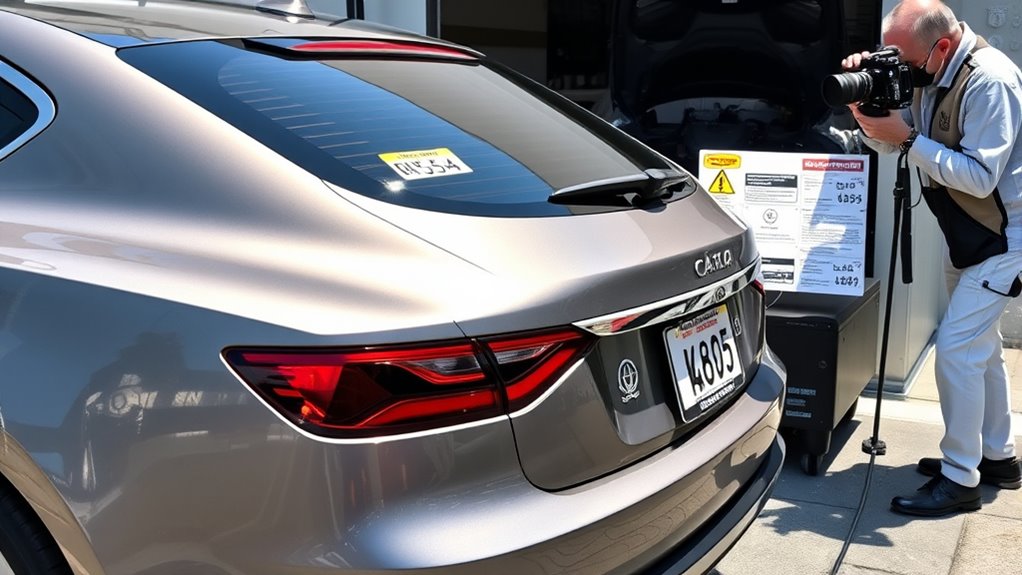
Verifying your tuned car’s emissions compliance is essential to stay legal on the road, especially in states with strict regulations like California. You need to ensure your aftermarket parts or tunes have a CARB/EPA Executive Order (EO) exemption, certifying they meet emissions standards and bypass anti-tampering laws. Non-exempt tunes can cause smog check failures, particularly for 1996+ OBDII vehicles. California’s smog tests include visual inspections, tailpipe tests, and OBDII scans, which verify ECU software compliance. Deteriorated emissions and monitor readiness must meet OEM standards, with drive cycles confirming proper operation. Using certified laboratories or PEMS allows pre-certification testing. Always confirm your modifications maintain emissions compliance and that your vehicle’s documentation aligns with state testing protocols to avoid legal issues. Additionally, understanding Dog breeds – My dog names can help you choose a pet that supports your lifestyle and complies with local regulations.
Keep Documentation and Registration Up to Date

Keeping your vehicle’s documentation and registration current is essential for maintaining legal compliance after modifications. You should keep detailed receipts and invoices for all aftermarket parts and services, as well as bills of sale for major components like the engine, transmission, or frame. Record installation dates and suppliers for non-OEM parts, and prepare construction statements for DMV verification. Submit your vehicle for in-person DMV checks, obtain necessary certifications, and provide weight certificates if you’ve modified trucks or pickups. Update titles and ownership records by filing the appropriate forms, disclosing accident history, and notifying the DMV of structural changes. Always renew your registration annually with updated modification records. Retain copies of all documents, schedule verification appointments, and stay current to avoid registration hurdles and legal issues. Transparency in affiliate relationships is also important when handling documents related to your vehicle modifications. Additionally, understanding costs and credit factors can help you budget for any required inspections or certifications. Staying informed about vehicle modification laws can prevent unexpected legal complications. Regularly reviewing air purifier maintenance dos and don’ts and ensuring your vehicle modifications meet environmental standards can further safeguard you from legal issues.
Use Certified Parts for Critical Systems

Using certified parts for your vehicle’s critical systems helps maintain legal compliance and safety standards after modifications. Certifications like CAPA verify that aftermarket parts meet OEM standards for fit, performance, and durability, ensuring your vehicle remains roadworthy. NSF International certifies safety-critical components such as lighting and structural parts through rigorous testing, which is essential for safety and insurance coverage. Certified parts also help protect your resale value by preserving factory safety and functionality. Prioritizing the use of certified engine, transmission, brakes, lighting, and structural components guarantees your car’s compliance with regional regulations and safety requirements. These certifications demonstrate that your modifications meet legal standards, reducing the risk of inspection issues or fines and ensuring your vehicle remains safe and reliable on the road. Staying informed about regulatory updates can further help you select compliant parts and avoid potential legal issues. Additionally, understanding the importance of certification standards ensures you make informed choices when upgrading your vehicle. Moreover, aligning your parts selection with quality assurance practices can further enhance your vehicle’s safety and compliance. Incorporating thorough inspection procedures during installation can also prevent issues that compromise safety or legality. Regularly consulting authoritative sources, such as local hours of operation for service providers, can ensure timely and compliant maintenance or upgrades.
Obtain Professional Inspection and Certification
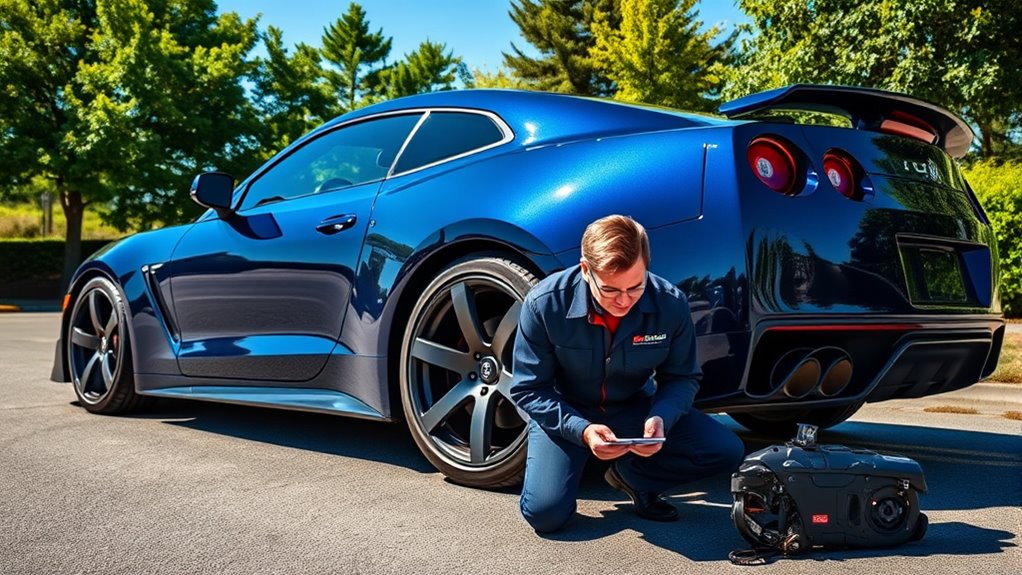
To guarantee your modified vehicle remains road legal, you must have it inspected and certified by authorized professionals. In Pennsylvania, only Enhanced Vehicle Safety Inspection Stations can legally inspect vehicles with modifications for titling purposes. These inspections verify compliance with safety standards, equipment requirements, and title branding, especially for reconstructed, flood, or specially constructed vehicles. The inspection process includes safety checks like lighting, brakes, and structural integrity. Inspectors at contracted stations must be trained and certified through state-approved courses, ensuring they follow strict guidelines outlined in PUB 645. After inspection, the station submits the necessary documentation, such as the MV-426B form, directly to PennDOT. Keep in mind, out-of-state titles may require additional PennDOT processing, regardless of inspection results. Additionally, understanding the inspection standards can help ensure your vehicle passes without issues. Regularly reviewing vehicle modification regulations can prevent potential legal complications during the certification process. Being aware of current regulatory changes can also prevent potential legal complications during the certification process. Familiarity with alimony laws can further help navigate legal requirements related to vehicle modifications and their documentation.
Stay Informed About Local Noise and Lighting Regulations

After having your vehicle inspected and certified, staying compliant with local noise and lighting regulations becomes an ongoing responsibility. Noise standards vary by state, with some like California setting a 95 dB limit measured by SAE J1169, while others like Florida restrict motorcycles to 83 dB. Many states use vague terms like “excessive noise,” making enforcement subjective. Testing methods include stationary measurements, acceleration tests, and noise cameras, though these can be unreliable or inconsistent. Modified exhausts and tuning can push noise levels beyond legal limits, risking fines or impoundment. To stay compliant, monitor local laws regularly, use EPA or CARB-certified parts, and consider installing adjustable mufflers. Engaging with community efforts to clarify regulations can also help ensure you stay within legal bounds and avoid penalties.
Maintain Proper Vehicle Registration and Licensing
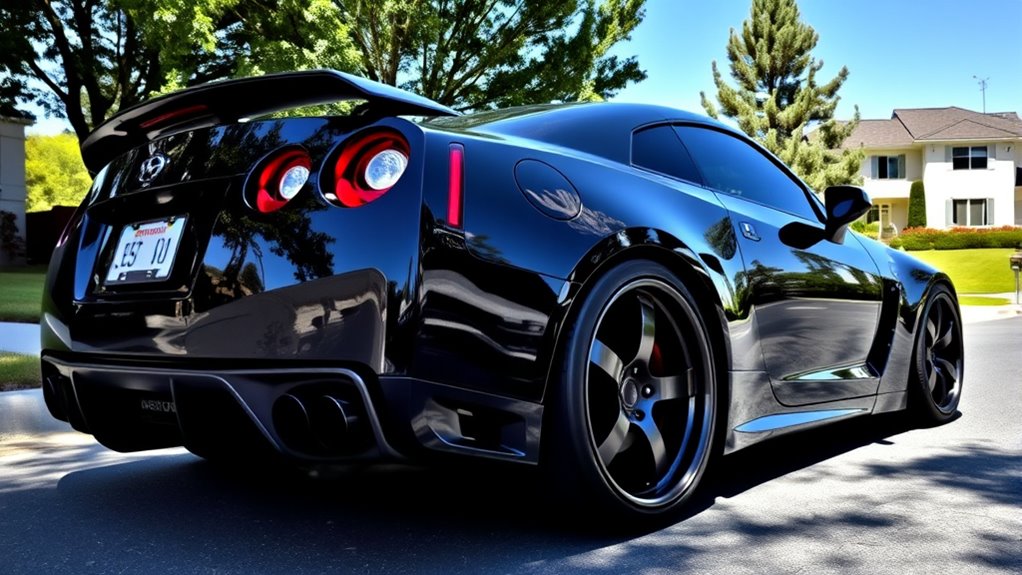
Maintaining proper vehicle registration and licensing is essential to guarantee your modified car stays legal on the road. Start by reviewing your state’s guidelines, like Tennessee’s, and ensure you have current out-of-state registration and lender details if applicable. Secure necessary documentation such as the Manufacturer’s Certificate of Origin (MCO) and detailed purchase receipts for major components like the engine and frame. Verify county-specific registration processes and whether inspections are required. Confirm that your vehicle modifications qualify as “specially constructed” per local definitions and prepare any construction statements needed. Schedule DMV inspections, retain purchase records, and obtain certification for weight and VIN compliance if needed. Lastly, provide emissions or smog certifications if required, and stay updated on your state’s registration fees and renewal deadlines to avoid penalties.
Be Prepared for Legal Checks and Penalties
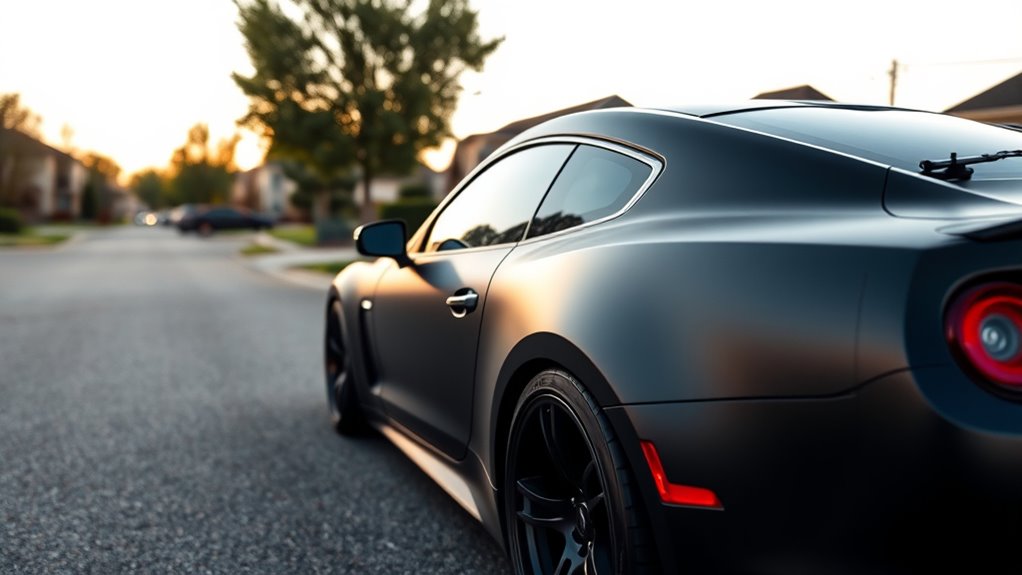
Being prepared for legal checks is essential to avoid fines, penalties, and other complications. You should familiarize yourself with local laws, emissions standards, noise limits, and safety requirements. Keeping documentation of your modifications and maintenance helps during inspections. Regular vehicle checks ensure ongoing compliance, and knowing the specific rules in your state can prevent costly violations.
| Check Area | Common Regulations | Potential Penalties |
|---|---|---|
| Emissions | Must meet standards; pass smog tests | Fines, license suspension |
| Noise Levels | Exhaust noise below decibel limits | Fines, vehicle impoundment |
| Exterior Lighting | Use of prohibited colors or bright lights | Fines, vehicle ticketing |
| Window Tints | Meet visibility requirements | Fines, rejection at inspections |
Frequently Asked Questions
How Often Should I Re-Inspect My Vehicle for Compliance?
You should re-inspect your vehicle for compliance regularly, especially if it’s tuned or modified. Typically, it’s wise to check at least once a year or before any scheduled smog or safety inspections. Keep an eye on your local regulations, as some areas require more frequent checks for modified vehicles. Regular inspections ensure your vehicle stays legal, safe, and performs at its best, preventing potential fines or failures during official tests.
Can I Legally Modify My Car’s Exhaust System?
You can legally modify your car’s exhaust system, but it depends on your state’s laws. Make sure your modifications don’t increase noise levels beyond legal limits and pass emissions tests. Use professional installers to guarantee compliance, keep records of your modifications, and stay updated on local regulations. If you comply with noise and emission standards, your exhaust upgrade can be legal, helping you enjoy your tuned car without legal worries.
What Are the Penalties for Non-Compliance With Safety Standards?
You’re wondering about penalties for safety standard violations. If you don’t comply, you could face hefty fines—up to $7,000 per violation—and total penalties of over $17 million for related infractions. Your vehicle might be impounded, and your insurance claims could be denied. Plus, you risk legal action or vehicle seizure if safety issues threaten public safety. Staying compliant helps you avoid these costly, stressful consequences.
Are Aftermarket Window Tints Legal in My State?
Your curiosity about aftermarket window tints is like a traveler maneuvering through a maze of laws and regulations. To find your way, you need to know your state’s specific VLT requirements, restrictions on reflective or colored tints, and rules about dual side mirrors. Check local DMV guidelines or consult a professional installer. Staying informed guarantees your vehicle remains a lawful vessel on the road, avoiding fines and penalties.
How Do I Verify if My Parts Are Carb-Certified?
You verify if your parts are CARB-certified by checking for EO numbers on the components or packaging, like “CARB EO D-123-1.” Cross-reference these EO numbers on CARB’s official database or look for compliance labels. You can also visit manufacturer websites for certification info. Always confirm your modifications have proper documentation and registration, especially if you plan to register or operate your vehicle legally in California.
Conclusion
Keeping your tuned car road legal is like steering a ship through stormy waters—you need to stay informed and prepared. By following these steps, you’ll guarantee your ride sails smoothly without running aground in legal trouble. Think of your car as a living puzzle, where each piece must fit perfectly. Stay vigilant, keep records, and respect the rules, so your passion for tuning stays on the open road, always cruising safe and sound.


